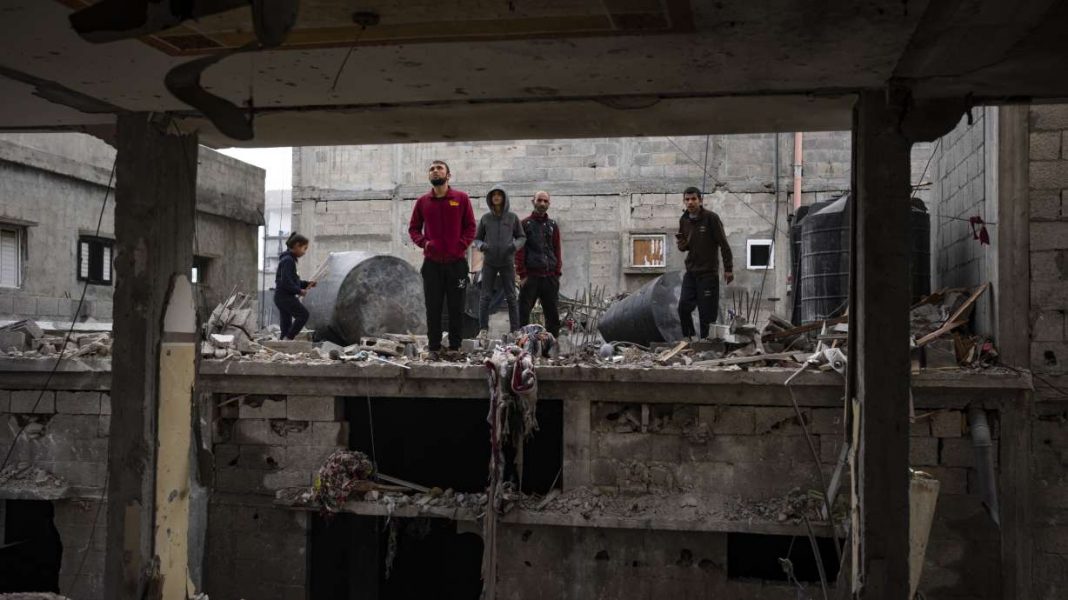From the heart of JERUSALEM — The Israeli Prime Minister, Benjamin Netanyahu, announced on Friday that he has instructed the military to devise a strategy for the safe evacuation of civilians from Rafah. This comes in anticipation of a potential Israeli incursion into the densely populated city in southern Gaza.
This declaration follows a wave of international condemnation, including from the U.S., regarding Israel’s plans to deploy ground forces into the city. Rafah, which shares a border with Egypt, is currently home to hundreds of thousands of individuals residing in expansive tent camps, having fled from conflict in other parts of Gaza.
Israel maintains that Rafah, after more than four months of warfare, is the final Hamas stronghold in Gaza.
“The objective of this war, which is to eliminate Hamas, cannot be achieved if we leave four Hamas battalions in Rafah,” stated Netanyahu’s office. “On the contrary, it is evident that intense operations in Rafah necessitate the evacuation of civilians from combat zones.”
The office further stated that Netanyahu has directed military and security officials to develop a “comprehensive plan” that encompasses both a large-scale evacuation of civilians and the obliteration of Hamas’ forces in the city.
Israel declared war after several thousand Hamas militants infiltrated southern Israel on Oct. 7, resulting in the death of 1,200 people and the abduction of 250 others. An Israeli air and ground offensive has since claimed the lives of over 27,000 Palestinians, the majority of whom are women and minors, as per local health officials. Approximately 80% of Gaza’s population has been displaced, leading to a humanitarian crisis marked by food and medical shortages.
Netanyahu has largely dismissed international criticism regarding the civilian death toll, attributing the endangerment of civilians to Hamas’ operations and concealment within residential areas. However, this criticism has intensified in recent days as Netanyahu and other leaders pledge to advance into Rafah.
“The objective of this war, which is to eliminate Hamas, cannot be achieved if we leave four Hamas battalions in Rafah.”
–Office of Israeli Prime Minister Benjamin Netanyahu
President Joe Biden expressed on Thursday that Israel’s conduct in the war is ”over the top,” marking the most severe U.S. criticism yet of its close ally. The State Department warned that an invasion of Rafah under the current circumstances “would be a disaster.”
The operation presents numerous challenges. It remains uncertain where civilians can seek refuge. The Israeli offensive has caused widespread destruction, particularly in northern Gaza, leaving hundreds of thousands of people without homes to return to.
Furthermore, Egypt has cautioned that any movement of Palestinians across the border into Egypt would jeopardize the four-decade-old peace treaty between Israel and Egypt. The border crossing between Gaza and Egypt, which is predominantly closed, serves as the primary entry point for humanitarian aid.
Israel has already initiated airstrikes on Rafah. Overnight and into Friday, two residential buildings in Rafah were targeted, along with two other sites in central Gaza, including one that damaged a kindergarten-turned-shelter for displaced Palestinians. Twenty-two people were killed, as confirmed by AP journalists who witnessed the bodies arriving at hospitals.
Related:
Recent comments from top U.S. officials regarding Rafah indicate escalating tension with Netanyahu following U.S. Secretary of State Antony Blinken’s visit to the region.
Blinken, who has been collaborating with Egypt and Qatar to mediate a cease-fire between Israel and Hamas, departed the region on Thursday without an agreement. However, he expressed optimism that a deal could still be reached, which would include an extended pause in fighting in exchange for the release of many of the more than 100 hostages held by Hamas.
Netanyahu appeared to snub Blinken, asserting that he will accept nothing less than “total victory.” The Israeli leader has stated that the war aims to dismantle Hamas’ military and governing capabilities and bring all hostages home. With Blinken still in the region, Netanyahu declared that achieving these objectives would necessitate an operation in Rafah. Vedant Patel, a State Department spokesman, warned on Thursday that proceeding with such an offensive ”with no planning and little thought in an area where there is sheltering of a million people would be a disaster.”
John Kirby, the White House’s national security spokesman, stated that an Israeli ground offensive in Rafah is “not something we would support.”
Aid agency officials have also expressed concern over the prospect of a Rafah offensive. “We need Gaza’s last remaining hospitals, shelters, markets, and water systems to stay functional,” said Catherine Russell, head of the U.N. children’s agency UNICEF. “Without them, hunger and disease will skyrocket, taking more child lives.”
As the war enters its fifth month, Israeli ground forces continue to concentrate on the city of Khan Younis, just north of Rafah. However, Netanyahu has repeatedly indicated that Rafah will be next, causing panic among hundreds of thousands of displaced individuals.
Shortly after midnight on Friday, a residential building near Rafah’s Kuwaiti Hospital was hit, resulting in the death of five members of the al-Sayed family, including three children and a woman. A second strike in Rafah claimed three more lives.
Another overnight strike in the central town of Deir al-Balah took nine lives. Also in central Gaza, a strike near a kindergarten-turned-shelter damaged the building, killing five and injuring several more. Witnesses reported that shelter residents were asleep at the time.
A woman, clutching a small girl in her arms, cried out as she arrived at the local Al Aqsa Martyrs’ Hospital: “What can we do? This is the work of the coward Zionist enemy that targets innocent civilians. Is this girl firing rockets at the Jews? May God help us.”





Netanyahu’s proactive approach shows his commitment to the safety and security of Israeli citizens. It is crucial to take necessary precautions and plan in advance to minimize harm in case of a potential invasion. #Agree